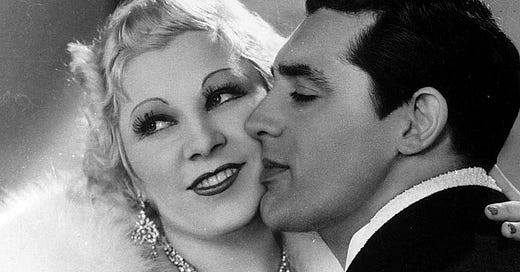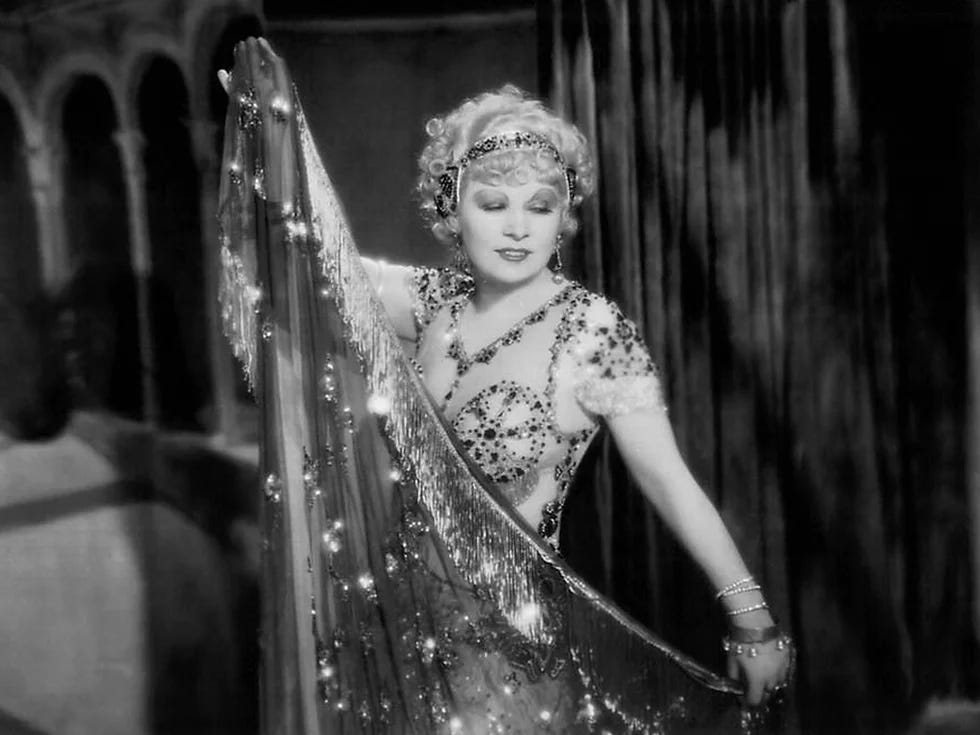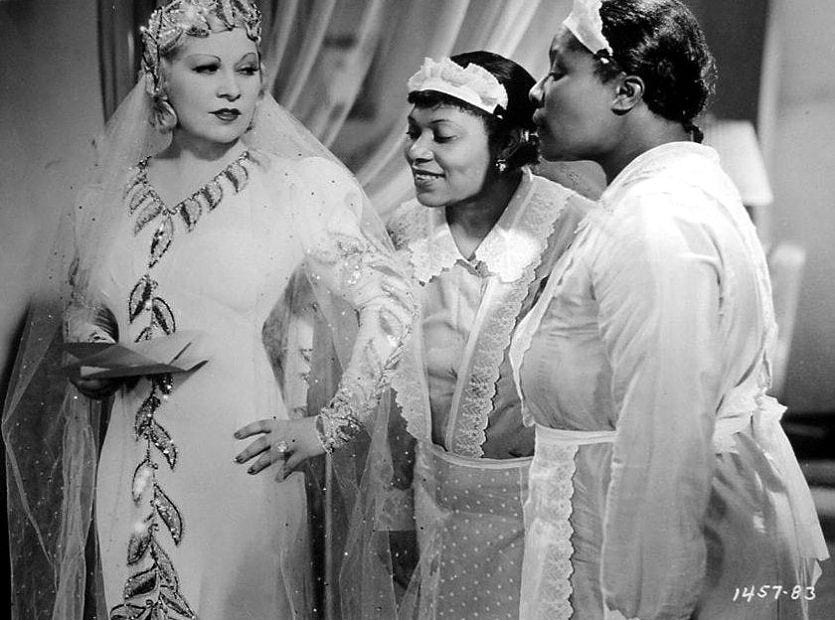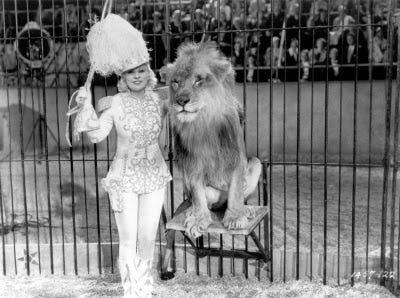It is somewhat ironic that in the near century since her film debut, Mae West has become synonymous with the idea of “camp,” or the semi-ironic enjoyment of garish, maximalist aesthetics. While West was made famous by her sarcastic persona, opulent clothes, and double entendres, they were at the time taken quite seriously by some. West herself seemed to have a somewhat tenuous relationship with her camp status, calling the genre “the kinda comedy that makes fun of me” in a Playboy interview. On-screen, no one makes fun of Mae West; her characters are independent, witty, and at the beginning, non-monogamous. Before the institution of the Motion Picture Production Code, she could do all this without shame. None of West's films epitomize that shameless persona better than 1933’s I’m No Angel.
One of the Production Code’s central aims was that films “not show too much.”1 For the Code’s moral ideologues, West was the exact opposite, sexually open and opulent, even rude. This made West an easy target in desperate need of “compensating moral values.”2 She Done Him Wrong, a massive hit made just before I’m No Angel, was pulled from theaters and cut to the Hays Office’s standards. Upon its full institutionalization, production of West’s It Ain’t A Sin was halted while the screenplay was rewritten completely, eventually seeing release as Belle of the Nineties. Released just after She Done Him Wrong, I’m No Angel is also West’s screenwriting debut. I’m No Angel thus presents a rare opportunity to see the “Mae West” character with West’s full authorship.
That the protagonist is named “Tira” is arbitrary. Like West, Tira is a performer famous for singing while dancing provocatively and is introduced as “the dancer of the age,” similar to West’s vaudeville descriptor of “the girl with a personality.” And like West, Tira “throws caution to the wind, but her hips go north, west, east and south!” While a sexual object, Tira sets the terms, moaning suggestively but still directing her boyfriend/flunky “Slick” (Ralf Harolde) to pickpocket the audience. Tira is the boss off-stage too, lounging and drinking while men line up to meet her after each show. The only guide she considers is a fortune teller’s prophecy of love with a dark-haired rich man. When we first see her off-stage, Tira is telling Slick off for his lack of ambition, no longer content to share her spoils with the show’s boss “Big” Bill (Edward Arnold). Slick sends in her next admirer, Ernest Brown (William Davidson), whom Tira instantly recognizes as a philanderer, even cracking a joke about Brown’s five marriages.
Tira’s flirtation takes on a more transgressive meaning when she agrees to a “private rendezvous” paid for by Brown; she is a sex worker, and apparently fine with that. Slick fails an attempt to blackmail Brown, fleeing after knocking the man out. Embarrassed, Brown declares his intention to sue Tira for entrapping and robbing him. Hearing the news, Tira does not panic or cry, nor run into anyone’s arms; she calls her lawyer. Needing extra funds, Tira goes to Big Bill and demands a raise. Bill agrees on the condition that Tira will perform lion-taming in addition to singing, even placing her head in the lion’s mouth for the finale. The act’s popularity brings Tira to New York, where she attracts the attention of rich socialite Kirk Lawrence (Kent Taylor). This brings Tira into direct conflict with Lawrence’s snobbish fiance Alicia (Gertrude Michael), who openly insults Tira’s perceived lack of class.
Tira never lets the talk get to her, insulting Alicia back and charming Lawrence more, leading to lavish gifts. When Lawrence’s cousin Jack (Cary Grant) steps in on Alicia’s behalf, he and Tira fall in love and agree to get married. Desperate to keep his main act, Big Bill pays Slick to sneak into Tira’s room, leading to a court case over fidelity. Tira wins over the judge and jury by cross-examining witnesses–many of them ex-lovers–and getting them to admit their part in past relationships. This also wins back Jack, who agrees to drop the case and pay Tira a settlement, only for her to tear up the check the moment they reconcile. Tira sings a modified version of her burlesque song “They Call Me Sister Honkey Tonk” about her marriage as the film ends. Such a traditional ending is another irony of West’s targeting by censors.
It is obvious that the problem is not that Tira triumphs, but that she does so the wrong way. Tira guiltlessly engages in behavior such as smoking, drinking, and casual sex, all while supporting herself financially and being extremely attractive to men. She never renounces her old ways or gives anything up but her cold exterior, and only for true love with Jack. Tira’s challenging of taboo not only makes her more desirable to wealthy suitors like Brown and Lawrence but is the reason she stands out. She even treats her African-American maid Beulah (Gertrude Howard) as a confidant, suggesting an identification with the working class across color lines.
Tira is still the boss though, and her boundary-pushing is mediated by factors such as race. This appears in I’m No Angel in a scene where Tira sings about her many successes to the utter delight of her maids, all heavy-set and ever-smiling. One of the film’s most famous quotes3 is an order barked at Beulah to punctuate a victory over Alicia. Tira’s outsider status is eased, and the audience can be sure that she is only challenging the system, not trying to break or change it.4 This is still notably different from other successes of the same year, such as George Cukor’s Dinner at Eight, in which the spoiled opulence of Joan Blondell’s heroine must amend her ways for love. Even Gold Diggers of 1933 (Dir. Mervyn LeRoy), which ends similarly with weddings to rich men, stresses the pureness of its heroines’ hearts in the end. Only Tira, and by extension Mae West, is able to get exactly what she wants the way she wants it.
Consider also the difference between I’m No Angel’s content and that of West’s next film, the aforementioned Belle of the Nineties. Not only is West’s character in Belle not a prostitute and her romantic interest heroic, but the ending includes a full wedding ceremony, as demanded by the censors. Despite saving Paramount from bankruptcy with her 1933 films, West continued to be censored heavily.5 Before production on West’s 1936 film Klondike Annie even began, Paramount assured the Censorship Office that the film’s ending would “indicate for the future a normal life and nothing that will bring condemnation from the most scrupulous.”6 In 1937, West ended her contract with Paramount permanently for Columbia, but never regained the success of her earlier films.
Post-code comedy saw the dominance of the screwball genre, which critic Andrew Sarris once categorized as “sex comedy without sex.” The opposite of the promiscuous “Mae West” character, these films are defined by their reliance on visual and physical humor and reducing references to sex to inferences, if not the subtlest hints. As her retirement from film between 1943’s The Heat’s On and 1970’s Myra Breckenridge suggests, it was not a genre West felt welcome in. While there are many strong screwball heroines, none of them possess West’s shameless confidence, or inhabit the same social fringes. Many of the witty, fast-talking women associated with Howard Hawkes’ comedies are caustic in order to cover up insecurity that is instantly allayed by the love of a good man. As screwball heroines are non-sexual, none of them ever hold jobs that imply power over men.
Though many screwball and other comedies made after 1933 challenged taboos and expectations, few were as brashly defiant or explicit as I’m No Angel. The film is not only a box-office milestone for West’s career, but the fullness with which it presents the “Mae West” screen persona. Unlike her later, censored films, West gets what she wants her way, and is open about the fact that she has sex and enjoys doing so. Not only does Tira win the man of her dreams without compromising herself, she wins the supposed sophisticates to her side. While still somewhat restricted by racial and class-based obstacles of the time, I’m No Angel is nevertheless a celebration of Mae West as a star. To the moral heads of the Production Code, it must have looked like a declaration of war, one they unfortunately won in the end.
Decherney, Peter. Hollywood: A Very Short Introduction. Oxford University Press, 2016. Pg. 113
Black, Gregory D. “Hollywood Censored: The Production Code Administration and the Hollywood Film Industry, 1930-1940.” Film History, vol. 3, no. 3, 1989, pp. 167–89. JSTOR, http://www.jstor.org/stable/3814976.
“Beulah, peel me a grape!”
Expanded in: Robertson, Pamela. “MAE WEST’S MAIDS: RACE, ‘AUTHENTICITY’, AND THE DISCOURSE OF CAMP.” In Camp: Queer Aesthetics and the Performing Subject: A Reader, edited by Fabio Cleto, 393–408. Edinburgh University Press, 1999. http://www.jstor.org/stable/10.3366/j.ctvxcrp56.34.
Curry, Ramona. “Mae West as Censored Commodity: The Case of ‘Klondike Annie.’” Cinema Journal 31, no. 1 (1991): Pg. 64. https://doi.org/10.2307/1225162.
Curry, Pg. 61.







